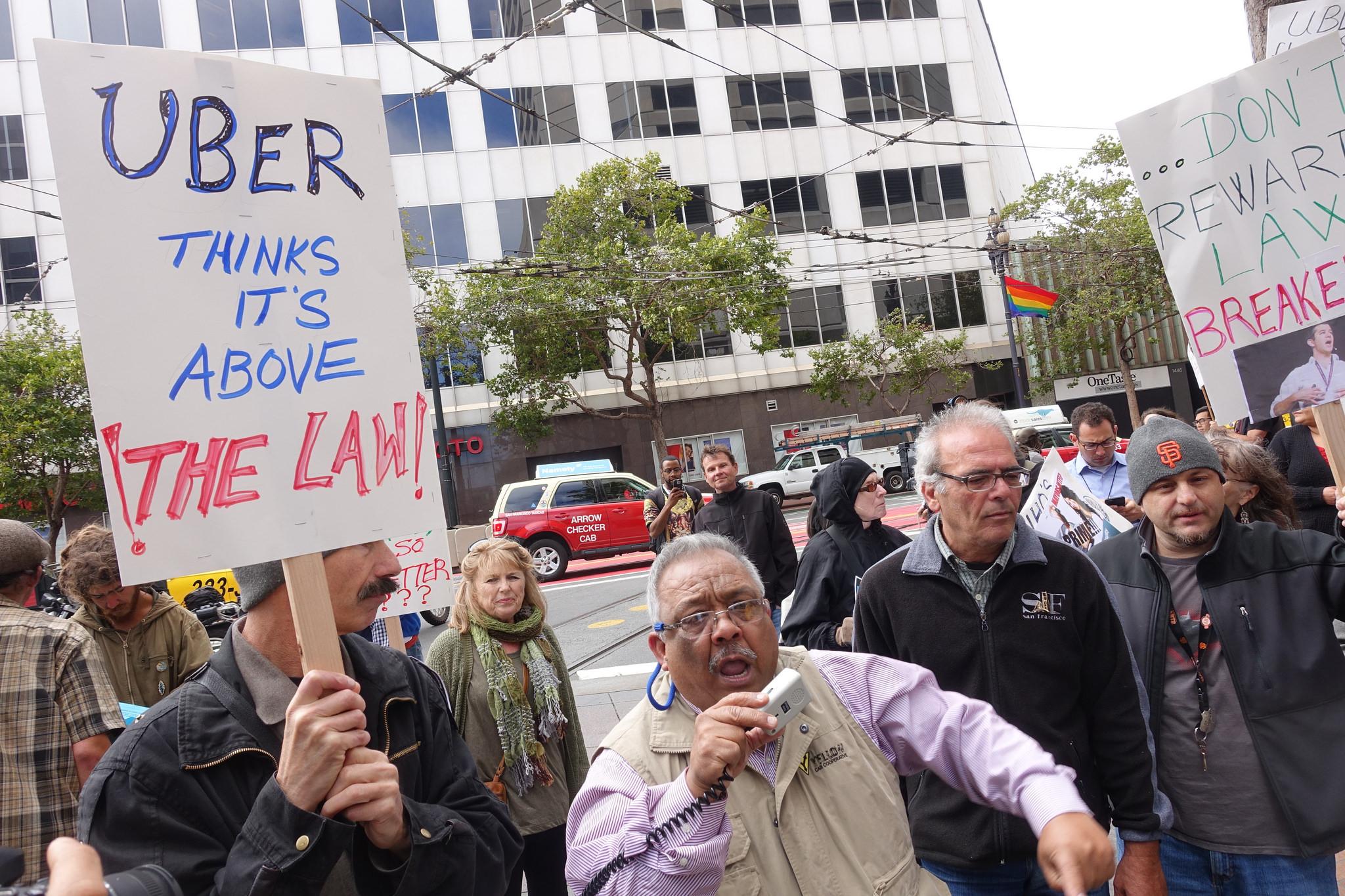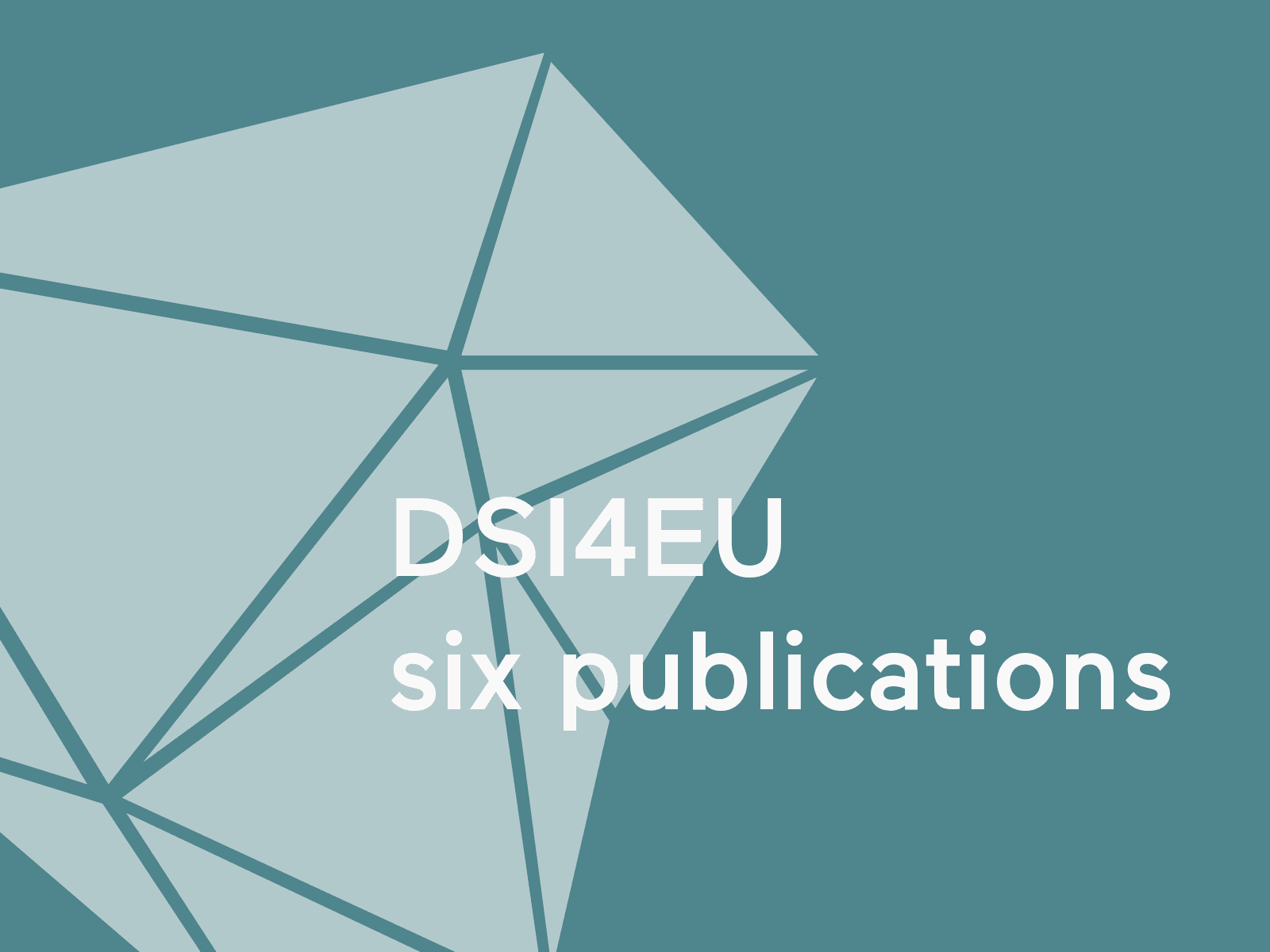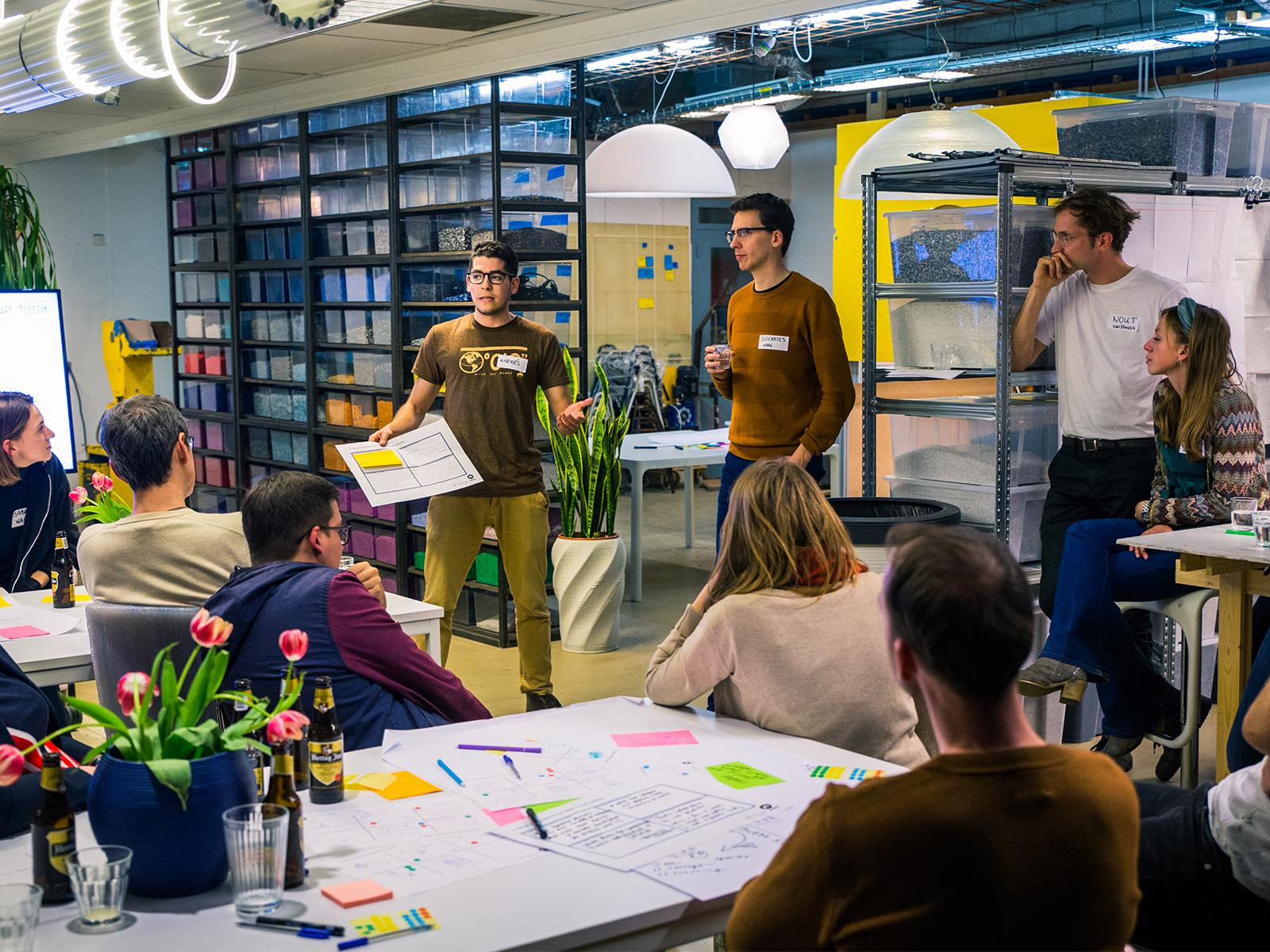The sharing economy is having an enormous impact on our cities. In the coming years new technological developments will change them even more drastically. The question is: who owns the platforms? The Google's and Airbnb's of this world, who are unaccountable and primarily in it for the money? Or the platform cooperatives, who focus on open technology, the commons and actual sharing? Should we take it one step further and radically change our economic thinking?
It has been said many times before: the Internet is a double-edged sword. On the one hand the Internet has opened up endless amounts of opportunities. It enables likeminded souls, innovators and small local initiatives from all over the world to interconnect, organize, share, cooperate and co-create. Knowledge can spread freely and anyone can join in. Its distributed, horizontal architecture (often referred to as peer-to-peer, equal-to-equal) gives the Internet the power to undermine centrally organised markets and traditional hierarchies, giving space to wonderful, more democratic, reciprocal and bottom-up initiatives.
Unfortunately, there are serious reverse sides too. A handful of tech companies have managed to undermine the Internet's decentralised and open architecture. Companies like Google, Uber, Airbnb and Facebook centrally store and exploit intelligence and Internet user's data. By providing free services they are creeping into every aspect of our lives, compromising our privacy, taking over ownership of each and every action we take, monitoring and profiling us, flooding us with advertisements and influencing our behaviour. There is no transparency about how these data are accumulated, or what exactly happens to them. Their algorithms decide which information reaches us and which not and keep us trapped in filter bubbles. The deep pockets they have puts them ahead of competition in Artificial Intelligence and deep learning.
Extractive
Often companies like Uber and Airbnb are mistakenly associated with the sharing economy. Sharing is not a good term to describe their extractive business model. It is better to refer to them as platform corporates that coordinate and define rules for transactions. The data and cumulated intelligence the platform develops is not shared. With a lot of financial power, these players aggressively conquer new markets and graze the world. The negative side-effects are of no concern to them.
The platform cooperatives are the true representatives of the sharing economy. Their existence is based on reciprocity, collectively creating value and sharing it with everyone who contributed. Strengthening the position of cities and its citizens is their main goal. So, instead of parasitising on public value, a community of activists, coders, researchers and designers from Amsterdam, Barcelona, Venice, New York and Mexico City decided to raise an alternative (cooperative) platform, FairBnB, based on transparency, co-ownership and added value for the neighbourhoods.
Not patents, profits and market shares fill the minds of the people involved with platform cooperatives, but the commons. All the cultural and natural resources accessible to all members of a society can be considered as the commons. Water, land and resources, but also open knowledge, open tools, open technologies, open culture, open infrastructures and privacy by design. The free operating system Linux is a good example of these cultural or knowledge commons, that enables the public to view, edit, and contribute to its code. Arduino, the open hardware platform that enables tinkering en citizens science is commons based. Network technologies are essential infrastructures. Society and citizens depend on it more and more. Privatisation of water is seen by many people as a no go, why should we allow private companies to control our Internet services, our data and our algorithms? Especially now step by step platform corporations are taking over the responsibilities of the state, accumulating more and more power, excavating our media, conduct, sovereignty and political systems.
It is remarkable that most governments, city councils and institutions choose to work with platform corporations instead of cooperatives. The Dutch consumers' association promotes the online platform Next Door, that is backed by big Silicon Valley investors and not the local alternative GebiedOnline, a cooperative that enables citizens to improve the livability of their street, neighbourhood or city. Why?
The newly elected president of France, Macron, proudly opened Station F, a space for 1000+ startups. With this ‘largest tech incubator of the world’, Paris wants to compete with the Silicon Valley. But who are the companies that are on the strategic board? Facebook and Amazon. Station F is an exact copy of the Silicon Valley. A gigantic farm for European talent to be milked by giant tech firms. Is that all Europe has to offer? If we really wants to innovate we should invest in new open, fair and inclusive value creation and strategies. We have to make sure cities and communities benefit and prosper from new innovations and technologies instead of suffer and get drained. It is one of the biggest challenges of our times. There are two action perspectives.
The first one is: break the power of the big platform cooperatives and open the black box.
Tech companies are not only omnipresent on the Internet, they are also shaping the direction in which our society and cities are developing. Governments increasingly rely on technology to regulate industries and deliver citizen services. It is key to be aware of the choices and premises of the designers, engineers and software developers who write the code of the technology that invades and shapes our everyday lives. Data and algorithms are not neutral, not objective. If these are secret, it is impossible to survey the logical reasoning behind the algorithms and instructions, the if-then-structure. If these are not public, how can we verify or influence them? How can we make our governments, or the private companies that increasingly take over quasi-governmental responsibilities accountable?
What are for example the moral considerations behind the self-propelled car? How is it programmed to react when it threatens to crash into a pedestrian: is the wellbeing of the driver more important or that of the pedestrian? And does it matter what kind of pedestrian it is? Do we really want to adjust our cities to the needs of unaccountable algorithms or do we continue to invest in bike riding and public transport? We as a society should have an influence on these kind of dilemmas. We cannot just let these extremely powerful, profit driven companies decide what our future and level of civilisation will look like. We have to take back control, before it's too late and the platform corporations become 'too big to undo'. We have to open the black box and work with open data, open algorithms and open soft and hardware.
With the existing laws and regulations, for example anti-trust laws, governments need to break the power of the big tech companies. In the EU Google's search engine has a market share of 90%. The competition authority of the EU already addressed Google for abuse of its dominant position with regard to the Google Shopping results. An 'algorithms authority' could decrease the power of the Airbnb's, Uber's and others, monitor their conduct and access the black box. Open-source and open data needs to become the new standard, not only for private persons, but always and for everyone. No patents on knowledge.
This brings us at the second action perspective: strengthen digital social innovation and platform cooperatives.
It is impossible to break the power of the big providers if there are no alternatives that are based on fair and democratic principles. The good thing is, they already exist: there is DuckDuckGo, the search engine that doesn't follow you and avoids filter bubbles or personalized search results, Signal as a counterpart to Whatsapp and Brave as alternative to Safari. These services are just as user friendly, without all the downsides like track and tracing you or collecting your data. People do need to start using these services instead of the most common ones, to really make a change.
Digital technologies can enrich the personal lives of its users, but they can also be of great use to tackle social problems. The goal of 'digital social innovation’ is that technology contributes social value instead of extracting it, bottom-up solutions leveraging on participation, collaboration, decentralization, openness, multi-disciplinarity. A lot of funding goes to startups that dream of stepping into the footsteps of people like Mark Zuckerberg. Instead we should ensure that funding for digital innovation – whether at EU, national, regional or city level – reaches the actors and areas with most potential for societal benefits.
Governments can also be a driving force itself though. The city of Barcelona for example has developed a roadmap to drive technological sovereignty for citizens. It aims to promote a more pluralistic digital economy and make a new urban innovation model possible based on the transformation and digital innovation of the public sector and the involvement of companies, administrations, the academic world, organizations, communities and people, with a public and citizen-based leadership. Part of this plan is a Technology Code of Practice, a set of criteria to help Barcelona select appropriate open technologies and define the commitments to open-source, open standards, interoperability, security and transparency. In Amsterdam Waag partnered with the Amsterdam Economic Board to set up the Code for Responsible Cities based on privacy, sovereignty and accountability. With wemakethe.city the City of Amsterdam embraces an inclusive innovation approach that actively engages citymakers and commons initiatives.
Plans like these are cause for optimism. This is the 21th century economic policy we need. We need to acknowledge that at the roots of our current problems lies an economic model that is long overdue. The extractive 20th century thinking leads to perverting something as radical and enriching as the Internet to platforms like Amazon, Facebook and the likes. On top of breaking the power of these companies and enhancing the position of digital social innovation, we could (and should) take it one step further, and change the economic paradigm.
What kind of model should that be? Regenerative economist Kate Raworth has the answer. According to her, the commons and environmental and societal boundaries should play a crucial role. In the current economic models, the commons are seen as externalities, not relevant for the analysis. This is a mistake: resources and knowledge (the commons) are 'must-haves', not 'nice to haves'.
Raworth baptised her blueprint for a 21th economy the doughnut economy. It is based on the idea that our goal should be: meeting the needs of all within the means of the planet. Her economic model can be explained by means of a doughnut: the planetary boundaries form the outer crust, that we shouldn’t overshoot if we are to safeguard Earth's life-giving systems, a social foundation forms the lower crust that we shouldn’t fall below it we want ensure no one falls short on life's essentials (from food and housing to healthcare and political voice). In an economy that is distributive by design, not only income but all sources of wealth, that we can share under the term the commons, should be divided in a fair way. Think of ownership of land and resources, money creation, business models (cooperations and employee-owned companies), but also knowledge (free open source or creative commons) and technology.
The importance of her theory is that she manages to capture all the global challenges we stand for in a clear diagram that has eye for all the 21th century complexities. If we stay between the just and safe space of the doughnut, we can tackle the problems around inequality, environment and the financial system. When the doughnut becomes our new paradigm, the transitions we need to make will become much clearer. We shouldn't use more ecological resources and services than nature can regenerate: there is no Planet B. This is why our economy should be circular, in sync with Earth’s cyclical processes of life. This also goes for our economic models and theories, that should be dynamic and evolving. Putting the commons in the core of our economic thinking.
We need to prevent that digital innovation is hijacked by mainstream industries. Otherwise innovation will be defined by extractive tech firms and held back by surveillance capitalist mechanisms. This is why it's so important to ditch the last century's macroeconomic thinking. We cannot fix the social, environmental and financial problems of our times without changing the systems that caused them. It's time for a 21th century economic narrative in which we can pursue social justice and ecological integrity. Europe should choose for true economic innovation and embrace the commons as its vital component.
This is an elaboration of the presentation Marleen Stikker of Waag gave at New technologies and digitalisation: opportunities and challenges for Social Economy and Social Enterprise, a joint workshop by The European Commission and the European Economic and Social Committee that took place on May 12th.
This article was edited by Wendy Koops.


